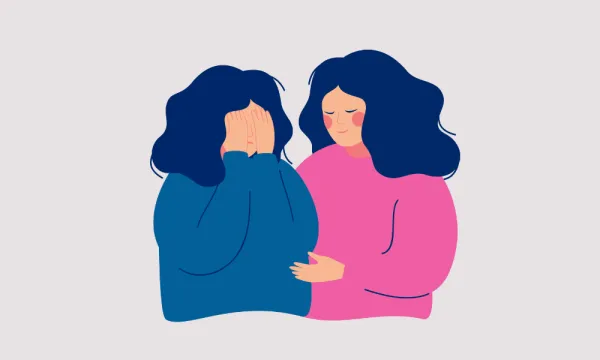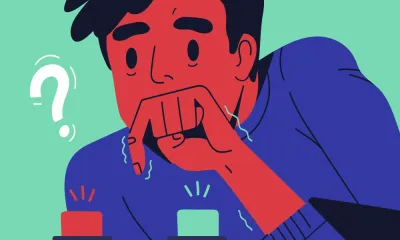You know that thing, the one that's been keeping you up at night? It's not a big deal. Look on the bright side; it could be worse. Just be positive!
I bet you feel so much better now. If you don't, you're obviously doing something wrong. Remember, happiness is a choice.
Sound familiar? If you’ve ever confided in someone and felt absolutely horrible afterward, you’ve probably been a victim of toxic positivity.
What is toxic positivity? And how can it possibly be toxic if it's positive? Well, we’ll explore this issue now.
Things to know
- Toxic positivity is an unhealthy preoccupation with positive thinking that forces you to deny the existence of unpleasant emotions and maintain a positive attitude no matter what.
- Toxic positivity differs from optimism in that it is unrelenting and a complete denial of painful emotions. Optimism allows you to appreciate and express genuine emotion without disregarding the reality of a situation.
- The damaging effects of toxic positivity include negative emotional outcomes, decreased personal growth and superficial relationships.
There's still more to explore; here's what we'll cover:
- What Is Toxic Positivity?
- Toxic Positivity vs. Optimism
- The Damaging Effects Of Toxic Positivity
- How To Recognize Toxic Positivity
- How To Let Go Of Toxic Positivity
- Are You Guilty Of Spreading A Little Toxic Positivity?
What Is Toxic Positivity?
A positive outlook is often associated with increased well-being. Adopting a positive mindset is said to boost immunity and longevity, and it may be just what you need to counter the effects of stress.
Clearly, healthy positivity has a lot of benefits. However, positivity can also be harmful—especially if it's insincere, forceful, and invalidating during times of adversity.
Toxic positivity is an unhealthy preoccupation with positive thinking. It is the notion that you should only see the positive side of every experience, regardless of how tragic it may be. It forces you to deny the existence of unpleasant emotions and maintain a positive attitude no matter what.
Toxic Positivity vs. Optimism

Toxic positivity takes optimism to a whole new extreme and rejects the broad spectrum of human emotion. Optimism, on the other hand, is the ability to remain hopeful and express genuine emotion without disregarding the reality of a situation.
When we are optimistic, we anticipate good things to happen. Imagining a better future can help us push through when things get tough. Toxic positivity, however, is unrelenting optimism and a complete denial of painful emotions —even when they are justified.
Optimism allows us to appreciate our emotions, leading to learning and growth. We learn to accept that although things may be hard now, they won’t always be that way. We also come to terms with the duality of circumstances. Situations can be both positive and negative. We can experience frustration and still be grateful.
The Damaging Effects Of Toxic Positivity
Negative emotional outcomes
Being on the receiving end of toxic positivity leaves us feeling dismissed, guilty and ashamed. When we internalize the positive-vibes-only mindset, we minimize our hardships and go through life faking happiness and gratitude.
Keeping up this disingenuous emotional state is mentally exhausting. Not to mention, suppressing uncomfortable emotions can negatively impact mental health. Denying our feelings makes us feel worse in the long run. And this can lead to mental health issues such as anxiety and depression.
Decreased personal growth

Toxic positivity robs us of the ability to grow from emotionally challenging situations. We grow in many ways through difficult experiences and gain a greater appreciation of our lives and relationships. Our levels of empathy increase, and we develop our strengths and maybe even discover our purpose.
We use our real feelings as catalysts for personal development, and our emotions help us figure out our needs. By burying them, we deprive ourselves of self-awareness and personal development.
Superficial relationships
When we tell someone to just be positive, we might think we're making them feel better, but we're actually shutting them down. Toxic positivity affects intimacy and connection, making it difficult for us to bond with others.
If we can't be honest with ourselves about our feelings, we'll have a hard time relating to those around us. When we are inauthentic and lack empathy, we are likely to have superficial relationships instead of meaningful ones.
How To Recognize Toxic Positivity
Positive thinking is so deeply ingrained into our culture that its toxic forms can often be hard to spot. Look out for these common signs of toxic positivity:
Denial
Denying the existence of problems or ignoring difficult situations is a sign of toxic positivity. Sadly, we expend valuable mental energy on disguising our true feelings instead of actually addressing the problems.
Masking

Instead of being authentic about how we feel, we engage in masking behaviors. We may try to appear cheerful or hide behind socially acceptable statements like ‘everything happens for a reason’ or ‘maybe it was for the best.’
Shaming
Whether it's directed towards ourselves for not being positive enough or launched at the people around us for their negative thoughts, shaming is damaging.
Toxic positivity makes us minimize our hardships. We also subject the people around us to this damaging behavior when we minimize what they are going through.
Shutting someone down is a lot easier than showing up for them. By insisting they remain positive, we sidestep the need to be empathetic and supportive. Shaming them for not having a positive attitude is an easy way to distance ourselves from difficult emotions.
Avoidance
Toxic positivity is often used as an excuse to avoid uncomfortable emotional situations. If you've ever been on the receiving end of toxic positivity, you know that well-meaning statements like ‘be positive’ usually leave you feeling dismissed.
Sometimes we internalize toxic positivity and use it to discount our own experiences. If you've ever pressured yourself to act happy when you had a genuine reason not to be, you used toxic positivity to avoid dealing with your feelings.

Invalidation
When we are going through difficult times, being unable to express complicated feelings and receive support can be distressing. Platitudes like ‘happiness is a choice’ or ‘it could be worse’ guilt us into thinking that if we aren't working hard on being positive, we’re doing something wrong.
As human beings, we need to feel that our emotions are valid and that we have the unconditional support of those around us. Being told our situation is a lesson or that someone out there probably has it worse than us is invalidating.
Fake gratitude
Using fake gratitude to suppress other emotions like sadness or frustration is another way toxic positivity manifests itself.
Perhaps you've been on the receiving end of this type of toxicity. You confide in a toxic friend only to be told to count your blessings. Maybe you’re guilty of doing this whenever something unfortunate happens to you.
How To Let Go Of Toxic Positivity
As if there weren't enough unrealistic standards to stress about, cue toxic positivity. Ironically, the constant pressure to stay positive is actually making us feel worse.

To let go of toxic positivity and start living a more authentic life, here are a few things you can do:
Be honest about how you feel
Acknowledge your feelings instead of suppressing them. Be honest when a situation makes you angry or sad.
Your feelings are legitimate, and it’s essential for you to process them. If you’ve been suppressing your emotions, there are many ways you can get in tune with them again.
Studies show that journaling can be a good way to process your emotions. You might find it helpful to speak to a mental health professional. This is a safe way to identify and express your feelings without feeling judged.
A professional can also help you work through negative and positive emotions. By acknowledging your full range of emotions, you'll develop emotional agility.
Protect yourself from toxic positivity
Surrounding yourself with positive people can improve your well-being. However, exposing yourself to people who take positivity to the extreme can trigger guilt and shame. Set boundaries and try to avoid people who dismiss or shame you for sharing your real emotions
Limit social media use

When you're experiencing tough personal circumstances, posts about people living their best lives can trigger frustration, embarrassment, and other negative emotions. Their highly filtered posts might give you the impression that they're handling things better than you.
Try to remember that what you're seeing isn't an accurate representation of reality. They also experience difficulties. Sometimes, limiting your social media use can be helpful. If you're following accounts that make you feel guilty or ashamed of your emotions, consider unfollowing them for your mental health.
Are You Guilty Of Spreading A Little Toxic Positivity?
Next time a friend or family member confides in you, don’t rush to ‘fix’ the situation. Here's what you can do to help instead:
Listen
Resist the urge to give them advice unless they ask for it. Don't encourage them to be 'positive.' Simply listen. Show interest and ask questions. Your body language communicates how engaged you are, so remember to maintain eye contact and nod. The key is to allow them to voice their frustrations.
Affirm
Consider why they feel the way they do as you listen. Avoid toxic positivity statements such as "stay positive" or "look at the silver lining." Focus on affirming them.
Assure them their negative feelings are legitimate. Sometimes it’s as simple as saying, “ I get why you would feel that way.” Then, offer to help or ask them how you can help.
By showing interest, understanding, and validating their feelings, you’re showing empathy. Instead of feeling dismissed, ignored, and invalidated, they’ll feel supported.









